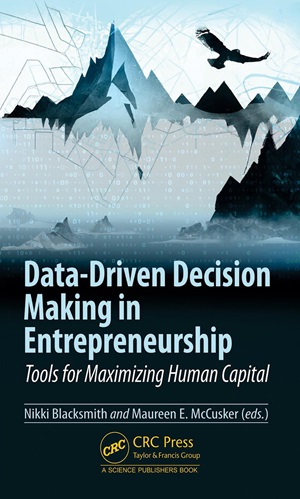“It is our belief that 1) science ought to be applied for the betterment of society, and 2) applied practice grows stronger with a reliance on science. Accordingly, we are grateful for all the scientists and all the practitioners who enable the functioning of our society. However, it is also our belief that the hardest work lies in translating science into practice and translating practice into scientific research questions. It is from this translation that unthinkably innovative breakthroughs emerge, large-scale societal changes form, and society’s most pressing and difficult problems are addressed.
RELATED ARTICLE: https://kogod.american.edu/news/harnessing-data-driven-decision-making-for-hiring-and-investments
Those who lead and effectively execute these translation efforts are few and far between- prodigies, making impact, and driving change,” writes Dr. Nikki Blacksmith and Dr. Maureen E. McCusker in their new edited compilation Data-Driven Decision-Making in the Entrepreneurial Ecosystem. “We are honored, humbled, and profoundly grateful that some of the top translators in the organizational and entrepreneurial sciences agreed to contribute to this volume. We acknowledge and thank the authors of this volume, from whom we have learned, grown, and been inspired by their shared passion and enthusiasm for leveraging human capital and data to transform the entrepreneurship ecosystem for the better.
We thank them for their courage to drive innovative work that challenges the status quo for advancement of all people in the entrepreneurial ecosystem. We have concluded our work on this volume feeling as though we have built a community of translators, innovators, change-makers, colleagues and friends. For all our readers, we welcome you to join us.”
This sense of conviction balanced with an appropriately objective, clinical overtone is shown throughout the pages of Data-Driven Decision-Making in the Entrepreneurial Ecosystem. The book feels like this odd but effective hybrid of business and leadership advice, anthropological and sociological excavation and analysis, and something interpersonal on behalf of each of the experts featured in the chapters. “…Traditionally called job analysis, I-O psychologists define work analysis as systematically gathering data about how, where, with whom, with what, and why work is performed. Thus, work analysis is a practical, evidence-based method for finding and communicating ‘the essential nature of the job’ to those who are not job experts…,” a key passage reads, in aforementioned vein. “…Suppose an entrepreneur hires a frontend engineer ably suited to the job who successfully performs her tasks.
But rather than frontend features, the product needs improved backend infrastructure for better scalability and integrations. Would performing the ‘front-end engineer’ job successfully matter much to helping the product scale and work with the wider technology ecosystem? Probably not. Of course, this example is simplistic and easily avoidable. Nevertheless, it illustrates what goes wrong when startup leaders fixate on finding the ‘right person’ for a job without asking whether a job successfully performed is relevant to business objectives.”
AMAZON: https://www.amazon.co.za/Data-Driven-Decision-Making-Entrepreneurship-Maximizing/dp/1032052775
In spite of this, the book also states: “…Fortunately, considering the business strategy should take the least amount of homework as most business leaders, especially entrepreneurs, have some business strategy in mind… Next, entrepreneurs should ask themselves this question: Would the ‘perfect’ person for this job contribute to the business’s objectives…Good timing is a big part of a startup’s success or failure. Similarly, the first step in a work analysis is to confirm that now is the right time for this job to exist. In addition, contextualizing the job’s purpose within broader goals helps create a mission statement that defines success in the role. Once success is defined, the right talent requirements can be identified.”
Cyrus Rhodes



























